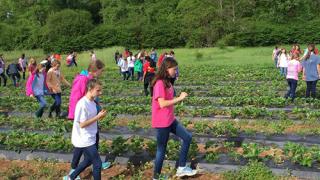To help students understand how nonprofit organizations effectively address issues of poverty, food insecurity, immigration, and disenfranchisement locally and globally. To help students experience and understand how farming works.
Students will:
- Understand challenges in our country and other countries around access to healthy foods.
- Understand challenges to helping people find long-lasting solutions to food insecurity.
- Compare two organizations and recognize how they address the issue of food insecurity in different ways – one locally and the other internationally.
- Experience work on a small-scale farm and learn first-hand from farmers about the path of food from farm to table.
PowerPoint presentation(s) of guest speaker(s).
Steinbeck, John (1937). Of Mice and Men.
- Steinbeck, John (1937). Of Mice and Men.
- Development In Gardening (DIG): https://www.dig.org/
- Global Growers: https://globalgrowers.org/
- Global Poverty Project: https://www.globalcitizen.org/live-below-the-line/
- Live Below the Line Challenge: https://www.livebelowtheline.com
- The Harvest: The Story of the Children Who Feed America (film): https://shineglobal.org/
Teacher provides a brief introduction, making the following points:
- Nonprofits provide resources to help empower communities to break the cycle of poverty that sometimes refugees can fall into when they arrive in the U.S. due to cultural differences, lack of education around current policies and laws, systemic challenges and stigma associated with illegal immigration, etc. Global Growers is doing this locally (but with an international connection). Development in Gardening (DIG) focuses on international communities struggling with chronic poverty and health-related issues.
- The characters George and Lennie that we’ve studied in Of Mice And Men were stuck in a cycle of poverty; they had no way out.
- Fortunately, today in our community, farmers like them (many of whom are immigrants or refugees from other countries) have nonprofit organizations like Global Growers and DIG to help empower them to create their own sustainable economic opportunities through gardening. Both organizations work with farmers around sustainable gardening and health issues.
- Both organizations provide economic opportunities for the populations they serve and address health, education, and cultural aspects of farming.
- Representatives of DIG and Global Growers will help us understand: How can nonprofits effectively address issues of poverty, food insecurity, immigration, disenfranchisement, etc. on both an international and local scale?
Representatives from nonprofit organizations deliver PowerPoint presentations they had prepared, sharing their own experiences, challenges and knowledge on the topics. A summary of the type of information they share with students follows.
Key aspects of DIG’s presentation:
- Mission of the organization
- Overview of what they do and where they work and the populations they serve – illustrates for students how an organization works internationally
- How they address the problems of:
○ Access to fresh, healthy food
○ Building local community and support systems in West Africa
○ Education and spreading awareness and resources
○ Sustainability
○ Job training
○ Health issues (including HIV)
○ How they help create economic opportunity for farmers
- DIG also explained the Live Below the Line Challenge, a campaign of the Global Poverty Project issued to raise awareness of the poverty line by challenging people to live at the equivalent of the extreme poverty line for five days (i.e., $1.50 or less per day spent on meals).
Key aspects of Global Growers’ presentation:
- Mission of the organization
- Overview of what they do and where they work – illustrates for students how an organization focuses locally but can have an international link
- Video and photos? Who are the refugees they work with, where are they from and how did they get here? What are some of the refugees’ struggles when they first arrive here?
- How they address the problems of:
○ Access to fresh, healthy food
○ Building community and support systems in Atlanta for people who may not understand the systems or the cultures
○ Education and spreading awareness and resources
○ Sustainability
○ Job training
○ Health issues (including HIV)
○ How they create economic opportunity
○ Why it is important to produce food that is culturally appropriate. Provide a cooking demonstration.

Service Experience: The seventh grade travels to Burge Plantation in Mansfield, Georgia to experience working on a smaller-scale, locally owned farm in rural Georgia. Some of the jobs students complete include picking weeds in a strawberry field and preparing fields for planting. The students hear from farmers on topics such as small-scale farming versus large-scale farming, organic farming, and the transporting of food from the farm to the market to the consumer.
The tie-in for this activity is through the reading of John Steinbeck’s Of Mice and Men. Students are asked to think about and empathize with the characters George and Lennie, two migrant workers who were stuck in a cycle of poverty yet who had dreams for their futures.
We don’t use an assessment, but a teacher might give a quiz, give a discussion grade, or assign written reflections to see how students make connections between concepts and topics they studied and the work of these organizations.
Class discussion provides good reflection. Students also do a written reflection about what they learned, including to think about the "Live Below the Line" challenge (making a pledge to eat on less than $1.50 per day for five days).